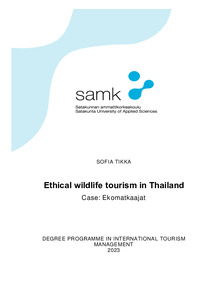Ethical wildlife tourism in Thailand : Case: Ekomatkaajat
Tikka, Sofia (2023)
Tikka, Sofia
2023
All rights reserved. This publication is copyrighted. You may download, display and print it for Your own personal use. Commercial use is prohibited.
Julkaisun pysyvä osoite on
https://urn.fi/URN:NBN:fi:amk-2023110128399
https://urn.fi/URN:NBN:fi:amk-2023110128399
Tiivistelmä
The purpose of this thesis was to examine the current wildlife tourism practices in Thailand with respect to elephant encounters by assisting Finnish tourism operators in their efforts to raise awareness, promote ethical practices, and encourage responsible behaviour among tourists. The thesis was carried out as a commission for Ekomatkaajat.
In the theoretical part, zoos and elephant destinations are explored as examples of animal-related destinations. Furthermore, the discussion encompasses topics such as animal ethics, animal rights and responsible tourism, encompassing wildlife and volunteer tourism.
The research used a quantitative research method. The data was collected using an electronic questionnaire. The researcher published a link to the survey on social media, such as Facebook and private WhatsApp groups, after which some of her friends shared the link. The survey was open between 09.05.2023 and 10.06.2023 and a total of 61 responses were received. Since the number of respondents was small, the research results can only be considered indicative.
A large number of respondents also do not like to visit animal destinations due to ethical reasons, but they are ready to pay more if they know that the destination is ethical and supports animal welfare. There were conflicting opinions about the welfare of animals. The research revealed that travelers are interested in the welfare of animals in animal destinations and they want to make ethical and responsible choices when traveling.
In the theoretical part, zoos and elephant destinations are explored as examples of animal-related destinations. Furthermore, the discussion encompasses topics such as animal ethics, animal rights and responsible tourism, encompassing wildlife and volunteer tourism.
The research used a quantitative research method. The data was collected using an electronic questionnaire. The researcher published a link to the survey on social media, such as Facebook and private WhatsApp groups, after which some of her friends shared the link. The survey was open between 09.05.2023 and 10.06.2023 and a total of 61 responses were received. Since the number of respondents was small, the research results can only be considered indicative.
A large number of respondents also do not like to visit animal destinations due to ethical reasons, but they are ready to pay more if they know that the destination is ethical and supports animal welfare. There were conflicting opinions about the welfare of animals. The research revealed that travelers are interested in the welfare of animals in animal destinations and they want to make ethical and responsible choices when traveling.
